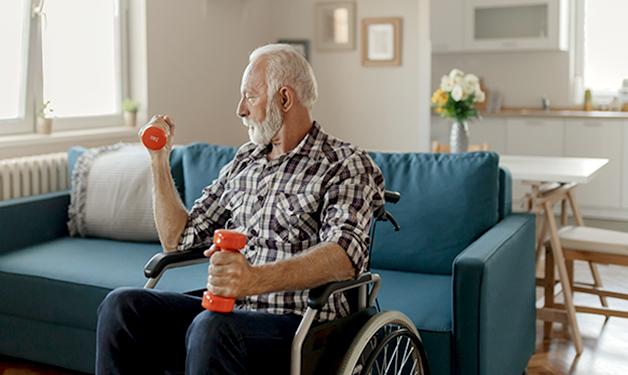
In-home exergame program helps older adult amputees overcome accessibility barriers to rehabilitation.
While physical distancing requirements for COVID-19 have proven challenging for most people, Vancouver Coastal Health Research Institute scientist Dr. Bill Miller and University of British Columbia (UBC) PhD student Gordon Tao view the situation as an opportunity to highlight telerehabilitation services and how they can be successfully provided to patients in a variety of ways. A recently published paper co-authored by Miller and Tao examined whether older adults with lower-limb amputation would complete an in-home exercise program (or exergame) in an unsupervised, distance setting.
“This is an extremely novel study in that it’s the first one to look at a supervised versus unsupervised physical rehabilitation intervention,” says Miller, a principal investigator at ICORD and the GF Strong Rehabilitation Centre.
“Much of the population of lower-limb amputees over the age of 50 have multiple morbidities, and their physical fitness and ability to engage in physical activity is compromised,” Miller explains. “So it’s vital to develop alternative ways to augment their physical and occupational therapy. Even though the learning curve declines over time, there’s always room for growth and more learning.”
“We want to provide patients with rehabilitation programs that will motivate them, promote their prosthetic use in terms of endurance and improve their capacity to do the everyday things they want to do.”

A telerehabilitation intervention, such as the Wii Fit exergame system paired with teleconferencing the researchers used in their study, also addresses accessibility barriers to physical rehabilitation services, says Tao.
“Not everyone needing rehabilitation services is located conveniently close to their rehab centre, so the costs in terms of money and time end up being tied to how frequently an individual can go,” he explains. “We want to find ways to both reduce costs and increase the likelihood that patients can have more frequent sessions with a group or clinician or on their own.”

Study participants included adults over 50 years old with lower-limb amputation. During the first week of the study, participants were divided into groups of three and came to the GF Strong Rehabilitation Centre to meet their group members, their trainer and to take part in the first three exergame sessions. During the second week, participants had the Wii Fit system and camera installed in their homes and were trained how to use them. Participants then shifted to the online exergame environment and continued virtually with sessions with their groups and trainer during weeks two through four. For weeks five through eight, participants were left unsupervised to choose for themselves whether or not to do exergame sessions.
The study found that participants did not use the exergame during the unsupervised weeks, suggesting that peers and the trainer may provide social pressure necessary for participation.
“In terms of overall participation during the supervised portion of the study, people showed up and wanted to take part,” says Miller. “The social group really brought participants together.”
According to Tao, a group intervention like the exergame allows people to tap into competitiveness, cooperative play, or community support to maintain motivation.
“Competition and cooperation can sometimes be antagonistic to each other but it’s important to remember that people get different things out of these types of social games,” he says. “We have to consider producing a greater variety of ways to socially engage with people and virtual games offer a way to do that.”
COVID-19 is showing us that we can be together separately and this approach to rehabilitation is very much in line with that.
More diverse rehabilitation offerings needed
Telerehabilitation interventions, such as the virtual exergame studied by Miller and Tao, are necessary now more than ever not only because of COVID-19 and physical distancing restrictions, but also because rehabilitation stays in hospital are getting shorter, explains Miller.
“The amount of contact time patients experience with rehabilitation therapists is being reduced, and in some cases drastically with various programs being changed from in-patient to entirely out-patient,” he says. “The principle driver of this is reducing health care costs.”

“There’s a real movement within rehabilitation interventions towards peer engagement, which offers another potential avenue for delivering interventions.”
“We know that there is so much informal and formal interaction going on when we’re in clinic with patients, so if we are taking them out of the clinic, we just need to make sure they have a way to congregate socially.”


